- Home
- Penelope Lively
Pack of Cards Page 22
Pack of Cards Read online
Page 22
When they arrived at the small hotel it was early evening. The judge carried their suitcase and the Wine Society carton in and set them down by the reception desk. The proprietor, bearing the carton, showed them to their usual room. As she was unpacking, Marjorie said, ‘I think you should have left that stuff in the car. Chambermaids, you know …’ The judge frowned. ‘That's a point.’ He tipped the contents of the box into the emptied suitcase and locked it. ‘I think I'll have a bath before we go out.’
He lay in the steamy cubicle, a sponge resting upon his stomach. Marjorie, stripped to a pair of pants, came in to wash. ‘The dear old avocado suite again. One day we must have an avocado bathroom suite at home.’ The judge, contemplating the rise of his belly, nodded; he was making a resolution about reduction of the flesh, a resolution which he sadly knew would be broken. He was a man who enjoyed food. His wife's flesh, in the process now of being briskly soaped and scrubbed, was firmer and less copious, as he was fully prepared to concede. He turned his head to watch her and thought for a while in a vague and melancholy way about bodies, about how we inhabit them and are dragged to the grave by them and are conditioned by them. In the course of his professional life he had frequently had occasion to reflect upon the last point: it had seemed to him, observing the faces that passed before him in courtrooms, that confronted him from docks and witness boxes, that not many of us are able to rise above physical appearance. The life of an ugly woman is different from that of a beautiful one; you cannot infer character from appearance, but you can suspect a good deal about the circumstances to which it will have given rise. Abandoning this interesting but sombre theme, he observed his wife's breasts and muscular but not unshapely thighs and the folds of skin upon her neck and remembered the first time he had seen her with no clothes on. She turned to look at him; ‘If you're jeering at my knickers, they're a pair of Alison's I grabbed out of the laundry basket by mistake.’ Alison was their youngest, unmarried daughter. ‘I hadn't really noticed them,’ said the judge politely. ‘I was thinking about something quite different.’ He smiled. ‘And don't leer,’ said his wife, flicking him with her flannel. ‘It's unbecoming in a man of your age.’ ‘It's a tribute to your charms, my dear,’ said the judge. He sat up and began to wash his neck, thinking still about the first time; they had both been embarrassed. Embarrassment had been a part of the pleasure, he reflected. How odd, and interesting.
It was still daylight when they drove to the restaurant, a violet summer twilight in which birds sang with jungle stridency. Marjorie, getting out of the car, said, ‘That veal and mushroom in cream sauce thing for me, I think. A small salad for you, without dressing.’
‘No way,’ said the judge.
‘I admire your command of contemporary speech.’ She went ahead into the restaurant, inspecting the room with bright, observant eyes. When they were sitting at the table she whispered, ‘There's that same woman we met last year. Remember? The classy type who kept putting you right about Britten.’
The judge, cautiously, turned his head. ‘So it is. Keep a low profile.’
‘Will do, squire,’ said Marjorie applying herself to the menu. ‘Fifteen all?’ she added. ‘Right?’
‘Right,’ said her husband.
Their acquaintance, leaving before them, stopped to exchange greetings. The judge, mildly resenting the interruption to his meal, left the work to Marjorie. The woman, turning to go, said, ‘So nice to see you again. And have a lovely break from juries and things.’ She gleamed upon the judge.
He watched her retreating silk-clad back. ‘Rather a gushing creature. How the hell does she know what I do?’
‘Chatting up the hotel people, I don't doubt. It gives you cachet, you note, your job. Me, on the other hand, she considers a drab little woman. I could see her wondering how I came by you.’
‘Shall we enlighten her? Sheer unbridled lust …’
‘Talking of which,’ said Marjorie. ‘Just how unprincipled would it be to finish off with some of that cheese-cake?’
Back at the hotel, they climbed into bed in a state of enjoyable repletion. The judge put on his spectacles and reached out for the suitcase. ‘You're not going to start going through that stuff now …’ said Marjorie. ‘At least have one whole day off work.’
‘You're right,’ he said. ‘Tomorrow will do. I'll have that Barbara Pym novel instead.’
The judge, waking early the next morning, lay thinking about the current trial. He thought, in fact, not about obscenity or pornography but about the profit motive. He did not, he realised, understand the profit motive; he did not understand it in the same way in which he did not understand what induced people to be cruel. He had never coveted the possessions of others or wished himself richer than he was. He held no stocks or shares; Marjorie, once, had been left a small capital sum by an aunt; neither he nor she had ever been able to take the slightest interest in the financial health of her investments. Indeed, both had now forgotten what exactly the money was in. All this, he realised, was the position of a man with a substantial earned income; were he not paid what he was he might well feel otherwise. But he had not, in fact, felt very much otherwise as an impecunicus young barrister. And importers of pornography tend, he understood, to be in an upper income bracket. No – the obstacle, the barrier requiring that leap of the imagination, was this extra dimension of need in some men that sought to turn money into yet more money, that required wealth for wealth's sake, the spawning of figures. The judge himself enjoyed growing vegetables; he considered, now, the satisfaction he got from harvesting a good crop of french beans and tried to translate this into a manifestation of the profit motive. The analogy did not quite seem to work.
The profit motive in itself, of course, is innocuous enough. Indeed, without it societies would founder. This was not the point that was bothering the judge; he was interested in those gulfs of inclination that divide person from person. As a young man he had wondered if this restriction makes us incapable of passing judgement on our fellows, but had come to realise at last that it does not. He remembered being involved in an impassioned argument about apartheid with another law student, an Afrikaner; ‘You cannot make pronouncements on our policies,’ the man had said, ‘when you have never been to our country. You cannot understand the situation.’ Richard Braine had known, with the accuracy of a physical response, that the man was wrong. Not misguided; simply wrong. A murderer is doing wrong, whatever the circumstances that drive him to his crime.
The profit motive is not wrong; the circumstances of its application may well be. The judge – with a certain irritation – found himself recalling the features of the importer of pornography: a nondescript, bespectacled man memorable only for a pair of rather bushy eyebrows and a habit of pulling an ear-lobe when under cross-examination. He pushed the fellow from his mind, determinedly, and got out of bed. Outside the window, strands of neatly corrugated cloud coasted in a milky-blue sky; it looked as though it would be a nice day.
The Braines spent the morning at Minsmere bird sanctuary; in the afternoon they went for a walk. The evening found them, scoured by fresh air and slightly somnolent, listening to Mozart, Bartok and Mendelssohn. The judge, who had never played an instrument and regarded himself as relatively unmusical, nevertheless responded to music with considerable intensity. It aroused him in various ways; in such different ways, indeed, that, being a thorough and methodical man, he often felt bemused, caught up by the onward rush of events before he had time to sort them out. Stop, he wanted to say to the surging orchestra, just let me have a think about that bit … But already he would have been swept onwards, into other moods, other themes, other passions. Marjorie, who played the piano in an unspectacular but competent way, had often suggested that the problem might be solved at least in part if he learned to read music.
She was no doubt right, he thought, wrestling now with a tortuous passage. When I retire; just the thing for a man reduced to inactivity. The judge did not look forward to retirement. But a f
ew moments of inattention had been fatal – now the music had got away from him entirely, as though he had turned over two pages of a book. Frowning, he concentrated on the conductor.
Standing at the bar in the interval, he found himself beside their acquaintance from the restaurant, also waiting to order a drink. Gallantry or even basic good manners required that he intervene. ‘Oh,’ she said. ‘How terribly sweet of you. A gin and tonic would be gorgeous.’ With resignation, he led her back to where Marjorie awaited him.
‘Your husband was so sweet and insistent – I'm all on my own this evening, my sister had a splitting headache and decided not to come.’ She was a tall woman in her early fifties, too youthfully packaged in a flounced skirt and high-heeled boots, her manner towards the judge both sycophantic and faintly roguish. ‘I was reading about you in The Times last month, some case about people had up for embezzling, of course I didn't understand most of it, all terribly technical, but I said to Laura, I know him, we had such a lovely talk about Britten at the Festival.’
‘Ah,’ said the judge, studying his programme: the Tippett next.
‘I'm Moira Lukes, by the way – if you're anything like me names just evaporate, but of course I remembered yours from seeing it in the paper.’ She turned to Marjorie. ‘Aren't you loving the concert?’; patronage discreetly flowed, the patronage of a woman with a sexual history towards one who probably had none, of a lavishly clad woman towards a dowdy one. The judge's antennae slightly quivered, though he was not himself sure why. Marjorie blandly agreed that the concert was superb. ‘Excuse me,’ she said. ‘I'm going to make a dash to the loo while there's time.’
The judge and Moira Lukes, left alone, made private adjustments to each other's company: the judge cleared his throat and commented on the architecture of the concert hall; Moira moved a fraction closer to him and altered the pitch of her voice, probably without being aware that she did either. ‘You must lead such a fascinating life,’ she said. ‘I mean, you must come across such extraordinary people. Dickensian types. I don't think I've ever set eyes on a criminal.’
The judge thought again of the importer of pornography. ‘Most of them are rather mundane, when it comes to the point.’
‘But you must get to know so much about people.’ She was looking very directly at him, with large eyes; a handsome woman, the judge conceded, rather a knock-out as a girl, no doubt. He agreed that yes, one did get a few insights into the ways in which people carry on.
‘Fascinating,’ said Moira Lukes again. ‘I expect you have the most marvellous stories to tell. I envy your wife no end.’ The large eyes creased humorously at the corners; a practised device, though the judge did not recognise this. ‘In fact I think she's a lucky woman – I still remember that interesting chat you and I had last year.’ And she laid on his arm a hand, which was almost instantly removed – come and gone as briefly as though a bird had alighted for a fleeting second. The judge, startled in several ways, tried to recall this chat: something about when Peter Grimes was first performed, or was it The Turn of the Screw? The interest of it, now, escaped him. He cast a quick glance across the foyer in search of Marjorie, who seemed to be taking an awfully long time. Moira Lukes was talking now about the area of Sussex in which she lived. Do, she was saying, look in and have lunch, both of you, if you're ever in that part of the world. The judge murmured that yes, of course if ever they were … He noticed the rings on her hand and wondered vaguely what had become of Mr Lukes; somehow one knew that he was no longer around, one way or the other.
‘The only time,’ she said, ‘I've ever personally had anything to do with the law was over my rather wretched divorce.’ The judge took a swig of his drink. ‘And then actually the lawyer was most awfully sweet, in fact he kept my head above water through it all.’ She sighed, a whiff of a sigh, almost imperceptible; thereby, she implied most delicately, hung a tale. ‘So I've got rather a soft spot for legal people.’
‘Good,’ said the judge heartily. ‘I'm glad to hear you've been well treated by the profession.’
‘Oh, very well treated.’
No sign of Marjorie, still. Actually, the judge was thinking, this Moira Whatshername wasn't perhaps quite so bad after all, behind that rather tiresome manner; appearances, inevitably, deceive. One got the impression, too, of someone who'd maybe had a bit of a rough time. ‘Well, it's a world that includes all sorts, like most. And it brings you up against life, I suppose, with all that that implies.’
The respect with which these banalities were received made him feel a little cheap. In compensation, he told her an anecdote about a case in which he had once been involved; a crime passionnel involving an apparently wronged husband who had turned out in fact to be the villain of the piece. ‘A mealy-mouthed fellow, and as plausible as you like, but apparently he'd been systematically persecuting her for years.’ Moira Lukes nodded sagely. ‘People absolutely are not what they seem to be.’
‘Well,’ said the judge. ‘Yes and no. On the other hand, plenty of people give themselves away as soon as they open their mouths.’
‘Oh, goodness,’ said Moira Lukes. ‘Now I'll feel I daren't utter a word ever again.’
‘I had in mind those I come across professionally rather than in private life.’
‘Ah, then you think I'm safe?’
‘Now, whatever could you have to conceal?’ said the judge amiably. A bell went. ‘I wonder where Marjorie's got to. I suppose we'd better start going back in.’
Moira Lukes sighed. She turned those large eyes upon him and creased them once again at the corners. ‘Well, this has been so nice. I'm sure we'll run into each other again over the weekend. But do bear in mind that I'm in the East Sussex phone book. I remember that case I read about was in Brighton – if you're ever judging there again and want a few hours' retreat on your own, do pop over and have a drink.’ She smiled once more, and walked quickly away into the crowd.
The judge stood for a moment, looking after her. He realised with surprise that he had been on the receiving end of what is generally known as a pass. He realised also that he was finding it difficult to sort out exactly what he felt about this; a rational response and his natural judgement of people (he didn't in fact all that much care for the woman) fought with more reprehensible feelings and a certain complacency (so one wasn't a total old buffer just yet). In this state of internal conflict he made his way back into the concert hall, where he found Marjorie already in her seat.
‘What on earth happened to you?’
‘Sorry,’ she said cheerfully. ‘There was an awful queue in the ladies' and by the time I got out it wasn't worth coming to find you. How did you make out with our friend?’
The judge grunted, and applied himself to the programme. The lights went down, the conductor reappeared, the audience sank into silence … But the music, somehow, had lost its compulsion; he was aware now of too much that was external – that he could achieve no satisfactory position for his legs, that he had slight indigestion, that the chap in front of him kept moving his head. Beside him, he could see Marjorie's face, rapt. The evening, somehow, had been corrupted.
The next morning was even more seraphic than the one before. ‘Today,’ said Marjorie, ‘we are going to sit on the beach and bask. We may even venture into the sea.’
‘That sounds a nice idea.’ The judge had thought during the night of the little episode with that woman and, in the process, a normal balance of mind had returned; he felt irritated – though more with himself than with her – that it had interfered with his enjoyment of the concert. It was with some annoyance, therefore, that he spotted her now across the hotel dining-room, with the sister, lifting her hand in a little finger-waggling wave of greeting.
‘What's the matter?’ said Marjorie, with marital insight. ‘Oh … Her. Well, I'll leave you to hide behind the paper. I'm going upstairs to get sorted out for the beach.’
He was half-way through the Home News page when he felt her standing over him. Alone. The sister
, evidently, had been disposed of.
‘Another heavenly day. Aren't we lucky! All on your own? I saw your wife bustling off …’ She continued to stand, her glance drifting now towards the coffee pot at the judge's elbow.
I am supposed, he thought, to say sit down and join me – have a cup of coffee. And he felt again that quiver of the antennae and knew now the reason. Marjorie does indeed bustle, her walk is rather inelegant, but it is not for you to say so, or to subtly denigrate a person I happen to love. He rattled, slightly, his newspaper. ‘We're off to the beach shortly.’
‘Oh, lovely. I daresay we'll go down there later. I wonder … Goodness, I don't know if I ought to ask you this or not …’ She hesitated, prettily, seized, it seemed, with sudden diffidence. ‘Oh, I'll be brave. The thing is, I have this tiresome problem about a flat in London I'm buying, something to do with the leasehold that I simply do not follow, and I just do not have absolute faith in the man who's dealing with it for me – the solicitor, you know – could I pick your brains about it at some point?’
The judge, impassive, gazed up at her.
‘I don't mean now – not in the middle of your holiday weekend. My sister was noticing your address in the hotel register and believe it or not my present flat is only a few minutes away. What would be lovely would be if you could spare an hour or so to look in for a drink on your way home one evening – and your wife too of course, only it might be awfully boring for her if you're going to brief me. Is that the right word? Would it be an imposition? When you're on your own like I am you are so very much at the mercy of …’ she sighed – ‘people, the system, I don't know what … Sometimes I get quite panic-stricken.’

 The House in Norham Gardens
The House in Norham Gardens Family Album
Family Album Life in the Garden
Life in the Garden Oleander, Jacaranda: A Childhood Perceived
Oleander, Jacaranda: A Childhood Perceived Cleopatra's Sister
Cleopatra's Sister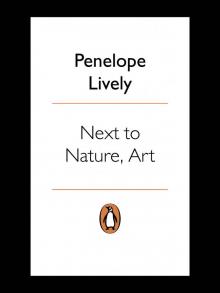 Next to Nature, Art
Next to Nature, Art A Stitch in Time
A Stitch in Time Moon Tiger
Moon Tiger The Photograph
The Photograph Heat Wave
Heat Wave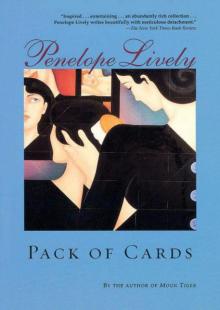 Pack of Cards
Pack of Cards Spiderweb
Spiderweb How It All Began
How It All Began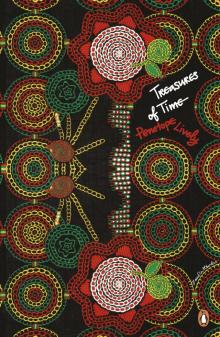 Treasures of Time
Treasures of Time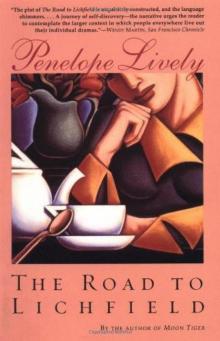 The Road to Lichfield
The Road to Lichfield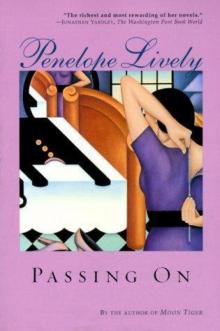 Passing On
Passing On Making It Up
Making It Up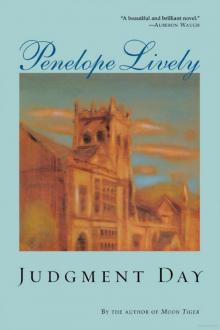 Judgment Day
Judgment Day The Purple Swamp Hen and Other Stories
The Purple Swamp Hen and Other Stories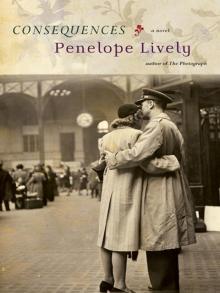 Consequences
Consequences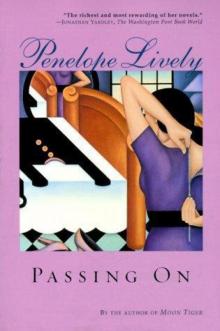 *****Passing On*****
*****Passing On*****